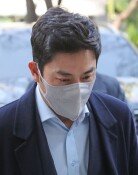Stingy Korea for Refugee Support
It was found that refugees and refugee applicants living in Korea are living under difficult conditions, devoid of proper benefits due to the absence of the governments refugee policy.
Such fact was brought to light after the Lawyers for Democratic Society (LDS) recently conducted a research on 70 refugees and refugee applicants. Dong-a Ilbo obtained the Report on the Actual Human Rights Conditions of Foreign Refugees in Korea written by the LDS explicitly yesterday.
As one of the ordinary civil subsidies project of the National Human Rights Commission, the LDS issued the report with the civic groups Good Friends and Pinancheo (asylum). This was the first time, regardless of government or civil level, that research on the actual conditions of refugees was conducted since Korean society first accepted refugee applications in 1994.
Exhausting Lives of the Refugees
As of the end of November, the total number of refugees and refugee applicants living in Korea are 377, including 31 who acquired refugee status.
The research was through a profound questionnaire conducted on eight refugees with refugee status and 72 refugee applicants during October and November. Those who were reluctant to expose their identities for reason of security were excluded.
According to the report, 51 out of the 70 respondents had jobs. Yet, 37 percent of them changed their employment from place to place as daily workers such as simple laborers or construction workers. Even most of those with regular jobs rendered simple manufacturing services in factories.
Except for the four jobless, the number of people who changed employment at least three times was 43 out of 66, or more than 65 percent. In particular, nine respondents replied that they switched jobs more than 11 times, showing that they were very distant from a stable vocational life.
Of all things, the destitute lives of refugees are clearly reflected in their monthly average incomes.
Only one person earned more than 1.5 million won a month, and 53 percent of respondents were found to earn less than a million won per month. Those who answered that they had no income numbered 16 (23 percent) as well.
It was known that the refugees are demanding vocational training (four people) and residential guarantee (four) the most, and for the refugee applicants, legal support (26) and medical benefits (24) ranked first.
The Governments Refugee Budget is 10 Million Won a Year
In fact, the government has been saying, Most refugees and refugee applicants are employed as regular workers and managing minimum living conditions.
The outcome of this research, however, directly flies in the face of the governments argument. Executive Secretary of Refugee Affairs Kim Ki-yeon of the LDS stated, As much as specific circumstantial evidences were found, the government also should reconsider its refugee policy.
In contrast to Britain, Germany, and New Zealand, which each has an independent body in charge of refugee affairs, only one employee in charge of illegal stay in the Immigration Bureau is taking care of all refugee recognition procedures in Korea.
An authority of the Justice Ministry revealed his thoughts, In the government, currently, no post is willing to assume the refugee problem. Since the annual budget for refugees is 10 million won, there is no reserve cash to support a decent policy.
Journalist Hong Se-hwa, who has experience of refugee recognition in France in 1981 recollected, In Frances case, the government provided basic life support allowance every month and sojourn and work permits even to refugee applicants. (We) enjoyed all the rights equal to those of the French citizens except for the right to vote.
Refugee Legal Support Committee Chairman Park Chan-woon of the LDS stated, Korea is the country with the most difficult refugee recognition procedures in the world and no support even after the recognition. It suggests a lot in that even a country with a small population like New Zealand has 70 public workers in charge of refugee affairs.
Yang-Hwan Jung Soo-Jung Shin ray@donga.com crystal@donga.com







